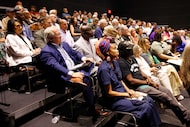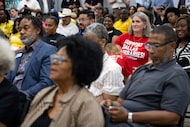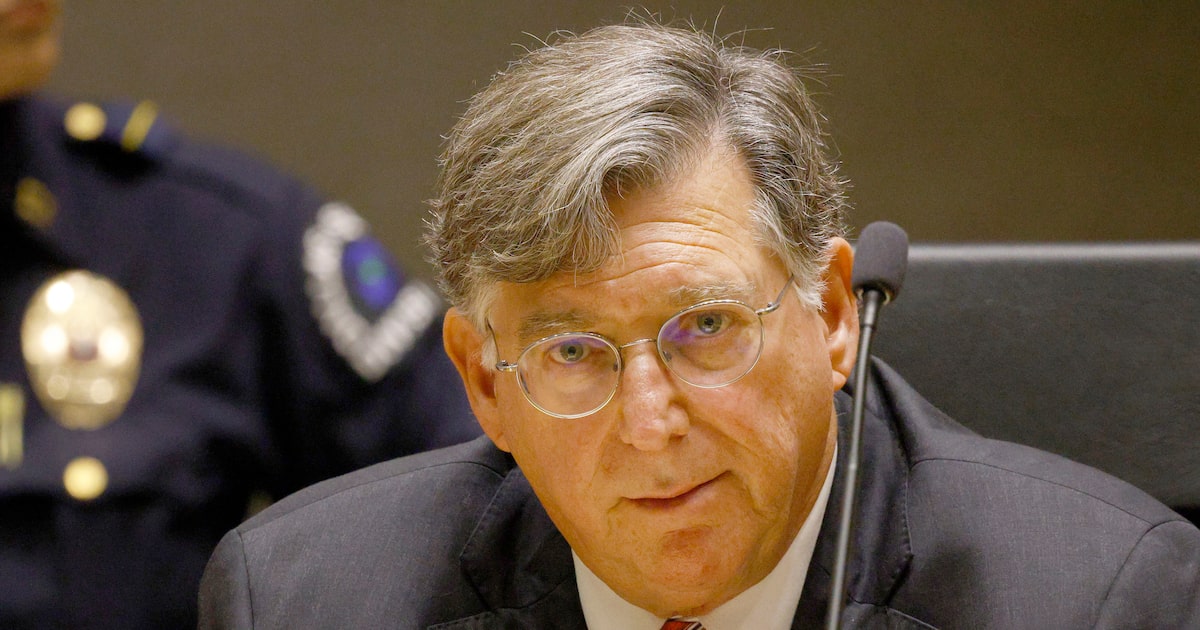Freshman City Council member Bill Roth has ideas to make $13 million worth of additional cuts to the city’s proposed $5.2 billion budget, and it is likely he may suggest other ways to trim the budget.
Already, steady opposition to his proposals is taking root.
In a memo sent out late Thursday, Roth said he identified programs that either fall short of federal mandates to eliminate diversity, equity and inclusion initiatives such as the “drivers of opportunity” and “the business enterprise hub,” or initiatives that are better suited for management by county, state and federal governments or philanthropic groups.
These include funding for arts and social services, as well as the Office of Community Police Oversight, which reviews and investigates police misconduct, the Office of Ethics and Compliance and climate action planning.
Political Points
His proposal targets 14 programs, including fitness initiatives for city employees.
“My rationale for these recommendations stems from a careful review of each program’s alignment with federal mandates, potential duplication of services provided by other governmental entities, and the overall necessity in a constrained budget environment,” Roth said in his memo.
Opposition to cuts for climate plans, arts funding
If accepted, the cuts would eliminate $305,000 for Public Art of Dallas and $362,000 for culture service contracts, which Roth said could be funded through private funding from donors and foundations.
“City subsidies in this area are not essential when we face pressing needs elsewhere, and shifting to private support would encourage innovation and sustainability in the arts sector,” Roth said about culture service contracts.
Roth’s recommendations come amid the backdrop of contracted sales tax collections and inflation. Roth said the economic pressures mean the city should “prioritize core municipal services such as public safety, infrastructure maintenance, and essential utilities.”
Several residents during budget town halls have expressed desire to maintain the existing library branches and investment in neighborhoods while lowering the tax burden.
In a Friday email shared with The Dallas Morning News, several residents supportive of arts organizations said they are planning on showing up to the City Council on Wednesday to oppose budget amendments targeting arts funding. “This has been a tough year, and there is a new threat — a budget amendment from one council member to further reduce General Fund arts funding beyond what was already proposed,” the email said.
Roth did not respond to additional requests for comment.
Related

Opposition has also come from environment advocates who played a role in advancing the city’s climate action plan, CECAP.
“Council member Roth wants to give Dallas the DOGE treatment, slashing budgets and killing programs. We’ve seen how that’s working in D.C., and we don’t want it here,” said Adrian Shelley, the Texas director of Public Citizen, an advocacy group. “We suggest council member Roth take some time to learn about what’s working in Dallas before proposing changes.”
Roth, in his memo, said investments in initiatives like fleet electrification and energy audits, “while well-intentioned, impose significant upfront costs without immediate, tangible returns.” The District 11 council member, who said the initiatives were too costly to prioritize at the moment, suggested revisiting climate strategies once federal incentives and expenses become available.
Kathryn Guerra, chair of the city’s environmental commission, said cutting financial investments for the future is short-sighted. “Some investments can take years to pay off, and that’s why we need leaders with long-term vision,” she said. “Electric vehicles are ultimately a cost savings for taxpayers. If we cut these programs today, they’ll pay for it in the future.”
Council members expect robust discussion
Council member Jaime Resendez said Friday he welcomed Roth’s desire to learn more. “But many of the proposed cuts would undermine core services that keep Dallas safe and thriving,” he said. “Fiscal responsibility is important, but so is protecting the priorities our residents have identified and rely on.”
Resendez highlighted cuts to Vision Zero, which seeks to eliminate traffic fatalities and cut severe injuries in half by 2030. Reduced funding could undermine public safety, he said. “Vision Zero impacts infrastructure, another core service,” he said.
Roth also suggested axing funding for Southern Skates, a roller rink the city has been saddled with for years. Park officials already suggested offloading the rink to a private operator in their budget recommendations.
The roller rink has been a source of frustration for city officials for over two decades. Originally built in 1999 with about $1 million, including public dollars from the U.S. Department of Housing and Urban Development intended for a housing project, the rink fell under the city’s stewardship after its original owner defaulted on a $400,000 loan.
The city has since struggled to run the site, making efforts over the years to lure a buyer and an operator.
Jack Ireland, the city’s chief financial officer, said he was unable to respond to media inquiries Friday as the city was still reviewing Roth’s memo. As of Friday afternoon, several other council members, including Maxie Johnson, whose district includes the roller rink, were also still reviewing the memo.
Related

Still, others said they were expecting robust discussion.
“I don’t support anything in the memo,” said council member Adam Bazaldua, who added that he was looking forward to the upcoming discussion where officials are expected to offer budget amendments and debate what needs to be cut or saved.
When city officials began crafting their budget, they had to overcome a $36.5 million funding gap, and a voter mandate to increase the number of police officers manning Dallas’ streets. To add to that, federal funding through COVID-19 relief funds has petered out and President Donald Trump has signed several executive orders that broadly require recipients of federal contracts or grants not to operate or support any programs that promote diversity, equity and inclusion.
In June, City Manager Kimberly Bizor Tolbert paused all policies and programs designed to promote diversity, equity and inclusion in an effort to retain $305 million in federal grants the city receives on average annually. Her proposed budget got rid of the Office of Equity and Inclusion as a singular department and combined it with the Office of Community Care, Housing and Homeless Services. “Drivers of opportunity,” previously “drivers of poverty,” was recast to pass federal scrutiny; however, according to his memo, Roth said this could lead to legal challenges.
Related

The city’s recent community survey showed streets, police services and social services were high on residents’ priority list. During a meeting with The News’ editorial board, Tolbert said the city was interpreting measures to tackle homelessness under the social services category.
Some of Roth’s cuts, Bazaldua said, could also veer into federal funding by way of the U.S. Department of Housing and Urban Development. The federal grants, if cut, would only send money back instead of helping to “bring any relief to our property taxpayers” and the proposed cuts showcased limited knowledge of the budgetary process, the District 7 council member said.
One category of HUD funding that is designed to provide housing to residents with AIDS was also included in Roth’s cuts. “In the interest of fiscal efficiency, these should be handled through county or state channels, allowing the city to focus on municipal specific services,” Roth said.
Traswell Livingston, director of the ASD-A Home for Life, said a cut in funding would impact the services his organization provides to several residents, who are often experiencing homelessness while struggling to find adequate health care for illnesses. The city leverages a small percentage of funding to get federal matches and distributes it to providers. Cutting city funding could eliminate the city’s administrative costs.
However, much of the funding — federal and local — is interlinked and has direct impacts on a resident’s quality of life. Loss in housing support could strain the existing homelessness services, and any cuts, he said, could have a domino effect. More residents on the streets. More residents in emergency rooms, more tents under bridges.
“Point blank. Period,” he said.
Updated 6:17 p.m. Aug. 29, to update the new name for ASD-A Home for Life.
